








CCBA Officers
James D. Doyle, President
Curt Norcini, Vice President
Robert Burke, Treasurer
Maria Janoski, Secretary
Charles T. DeTulleo, Editor Emeritus
Maria Janoski, Editor
Rami Bishay
Mark Blank, Jr.
Jonathan R. Long
Shannon McDonald
Catelyn McDonough
John McKenna
Mary Wade Myers
Sara Planthaber
Karyn L. Seace
Scott Slomowitz
Virginia Swiatek
Bill Wilson
CCBA Staff
Greg Nardi Executive Director
Melissa Willson Communications, Events, and Marketing Manager
The Chester County Bar Association’s quarterly publication, New Matter, has been provided to Bar Association members for four decades.
A valuable aspect of CCBA’s membership, New Matter aims to provide our members with information pertaining to current issues facing the practice of law, historic legal issues, continuing legal education opportunities, Chester County Bar Association activities, programs, meetings, functions, practice tips, procedures for attorneys, and items of personal interest to our membership.
The opinions expressed in this
are for general information only and are not intended to provide specific legal or other advice or recommendations for any individuals. The placement of paid advertisements does not imply endorsement by the Chester County Bar Association.






James D. Doyle, Esquire President Chester County Bar Association
always been at the heart of the CCBA’s success. Through the changes in our profession, the CCBA has provided support, connection, and resources for legal professionals across Chester County. A strong sense of community happens when everyone brings their unique talents and works together toward shared goals. As your incoming president, I want to focus on strengthening that sense of connection by encouraging greater involvement from all generations of our membership.
Dear Members,
I am honored and humbled to step into the role of President of the Chester County Bar Association (CCBA). I want to begin by extending heartfelt thanks to our immediate past President, Don Lynn, for his exceptional leadership and dedicated service. His guidance and commitment have greatly contributed to advancing the mission of the CCBA, and on behalf of the entire bar association, we sincerely appreciate his efforts.
As many of you know, I practice law at Gawthrop Greenwood in West Chester, a firm with a proud legacy dating back to 1904. It is with deep gratitude that I follow in the footsteps of past presidents, and I am particularly honored to be the 12th President of the CCBA from Gawthrop. It is an added honor to be one of the youngest presidents in the history of this prestigious bar association.
As I reflect on our bar association’s rich history, milestones, and achievements, I am reminded that community has
Each generation brings unique and invaluable perspectives, skills, and ideas. From our seasoned senior attorneys to our newest young lawyers, we all have something to contribute to the future of this association. Our goal is to ensure that every member, at any stage of their career, feels like an integral part of the CCBA.
To achieve this, we are launching a series of initiatives designed to support and engage our diverse membership. We will be introducing family-friendly events for members with young children and planning networking opportunities that will strengthen bonds among our senior attorneys. And, of course, we are committed to expanding the reach, energy, and impact of our Young Lawyers Division, ensuring that the next generation of legal professionals has a strong platform to contribute and thrive.
The success of the CCBA relies on all of us working together, whether you’ve been practicing for five years or fifty. By
fostering a more collaborative community, we can ensure that Chester County remains an exciting and supportive place to practice law.
I look forward to working with all of you in the coming year, and I am excited about the opportunities ahead. Let’s make 2025 a year of growth, connection, camaraderie and continued excellence.
And speaking of camaraderie, please mark your calendars for the 2025 Fall Bench Bar, taking place September 18-20 at the Borgata Casino in Atlantic City. It may be one for the record books.
Very truly yours,
James D. Doyle President, Chester
County Bar Association

consultation and expert testimony in disciplinary matters and matters involving ethical issues, bar admissions and the Rules of Professional Conduct
• Judge, Court of Judicial Discipline
• Former Chairman, Judicial Conduct Board of Pennsylvania
• Former Chairman, Disciplinary Board of the Supreme Court of Pennsylvania
• Former Chairman, Continuing Legal Education Board of the Supreme Court of Pennsylvania
• Former Chairman, Supreme Court of Pennsylvania Interest on Lawyers Trust Account Board
• Former Federal Prosecutor
• Selected by his peers as one of the top 100 Super Lawyers in PA and the top 100 Super Lawyers in Philadelphia
• Named by his peers as Best Lawyers in America 2022 and 2015 Philadelphia “Lawyer of the Year” Ethics and Professional Responsibility Law and Legal Malpractice Law 1500 Market Street, East Tower, Suite 1800 • Philadelphia, PA 19102 (215) 751-2863

Charles “Chuck” DeTulleo, Esquire, passed away at his home on December 9, 2024 at the age of 82. Chuck was a veteran of the U.S. Army, a graduate of the University of Delaware for undergraduate studies followed by Delaware Law School for his law degree. For over 40 years, Charles was a solo practitioner in West Chester, PA. He concentrated his law practice in Criminal Defense and Driver licensing cases. Chuck was a member of the Chester County Bar Association since 1980, participated in many ways but especially through the Criminal Defense Section, and as the long-time Editor of our quarterly newsletter, New Matter. He was honored most recently by the New Matter Committee by being named Editor Emeritus of New Matter
The thing that I remember the most about Chuck was his tag line… My name is Chuck DeTulleo, I do medical recalls for drivers’ licenses and … we would all finish it for him… you pay referral fees. He came to a lot of the different meetings for the CCBA and this was always how he introduced himself.
He got me into editing for the New Matter and I bet a good many others could say that same thing. “You don’t have to write,” he’d say. Then he’d casually ask, “Are you going to the ____________? Oh maybe you could write a small article. Nothing elaborate.” That’s how he’d suck you in and he was very good at it.
He was ever the gentleman. Every time we attended a night meeting together, he would always walk me back almost all the way to my office. Literally. Every time.
He was not afraid to express his emotions. He told people he loved them all the time. He loved his country, his family and his professions. He had great stories about beating the miliary at shooting practice challenges as a police officer.
He mailed me a postcard when he went away. Just a quick note on the back to brighten my day. Also, when he saw an article from a competitor of mine, he used to cut it out of the paper (yes – he still read the paper!) and he’d mail it to me. (Yes he still mailed things!) He did not want the competition to get a leg up on me. Very thoughtful.
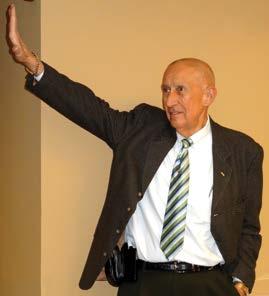
The Red Mass was very important to him. He used to take a $20.00 bill out of his wallet and hand it to me every year. I did not have the heart to tell him that it was $25.00 and it had been for years. Had he bothered to look at the form I e-mailed him, he would have seen that it went up!
He came up to me after the annual meeting in which I spoke the year that Joe Nescio died (2022) and I cried my eyes out. He handed me a $2.00 bill (which I still have) and he shared a story with me about how his grandfather had given him a $2.00 bill at a funeral and how excited he was to receive it as a child. He told me that he ordered $2.00 bills so that he would have them to pass out in hopes that the lucky recipient would experience the same childlike joy he did. I still get joy when I look at that $2.00 bill. Simple acts of kindness! That was Chuck!
From Bill Wilson, Esq.:
Chuck was not just a lawyer, and we in CCBA do tend to focus on that. He was just as proud of his other two careers, with Del. S. P. and with the U.S. Army. In regard to the latter, he was active in the 358th Civil Affairs Brigade until he hit his mandatory removal and retirement. On his suit jacket – every single day – he wore his Meritorious Service Medal lapel pin (along with his Star Trek tie tack). So, he was a bit of a character too.
From Mark Blank, Jr., Esq.:
Chuck and I worked together on the New Matter Committee/ Editorial Staff for more than three decades. After each meeting, we sat together and discussed the contents of the articles that we had submitted for review. Often our discussions were akin to a Socratic dialogue. Recently, I had the fortune to talk to Chuck, and we reminisced about our New Matter experiences. Oh, by the way, at the luncheon meetings Chuck never ate the croutons that were placed on his salad. Instead, he gave them to me.
Angie DeTulleo, Chuck’s Daughter
While I didn’t get the occasional sticky note pad or pen, I always got mailed copies of New Matter. Pops never met a magazine he didn’t want to keep. And believe me he has dozens of boxes with every edition of Consumer Reports ever published. I, too, read Consumer Reports, that Dad sends renewals every year at Christmas, but I don’t save them. However, I do have every New Matter he has ever mailed me (about 25) and I have read them all. He spent countless hours working on articles for New Matter My favorites are some of his older articles about attorneys that have made a difference in history. And I am sure if your readers don’t know how much he likes Star Trek and Star Wars, they will after reading his articles. He used his platform to remind everyone. He also loved citing the “free encyclopedia” wiki in his articles. Pops never met an encyclopedia he didn’t want to read either. He would sit for hours on a Saturday in the den going through every newspaper and magazine he didn’t get to read all week. As a kid I used to find that funny that he would read “day old” news. I now find myself doing the same. To close this out, I remember a few years ago he wrote an article about some legal issue with Christmas music. He loved Christmas, music, and especially Christmas music. He would play it in the car in the heat of the summer! How beautiful it was at his church service that we sent him to his final resting place singing Angels We Have Heard on High Rest in peace Pops!
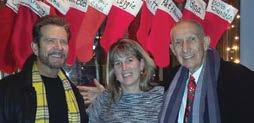
Even though we moved several years ago, I still have vivid memories of Pops coming through the back door of our West Chester home with a grocery bag full of tchotchkes from the latest legal conference and typically the latest edition of the New Matter publication. While the tchotchkes could drive my husband (Tom) crazy as he is opposed to clutter, the boys (Tyler and Cameron) would have some fun with them, playing with stress balls and whatnot, and I was happy to always have a post it note and pen available when needed. And what Pops knew he had in me was a good audience for the New Matter magazine, He was a very proud man, as he should have been, and he was proud of the work that he did in the legal community and for the publication. He took his contributions seriously, and I was happy and interested to hear of his latest topic covered in the most recent edition. And while I admittedly did not get through all of the legalese of all of the articles, I did go through those New Matter copies...because it mattered to him, and he mattered so much to all of us. Pun intended. He is loved greatly and sorely missed.
Karen’s story is spot-on and almost verbatim what I would have written. What struck me most over the past many months is how I came to FULLY understand the importance of New Matter and law to him. Once my dad was diagnosed with a “terminal” disease and given a prognosis of 18-24 months to live, at 80 years old, I (thoughtfully) urged and encouraged him to spend his remaining days doing things he loved. What ultimately came to pass was him essentially setting up an office on the couch and in his bed, with dozens of legal pads, folders, binders, pens and highlighters, and multiple phones. I’m sure you can imagine. He worked on referrals, renewed liability insurance, read and took copious notes on articles, had me organize the shredding of his outdated case files, and of course updated his Last Will and Testament and planned his own funeral. When New Matter awarded him Editor Emeritus, he immediately texted me pictures of the award and jotted notes to ensure that the award would be displayed in the funeral home.
You were his people.

WBy Christine Zaccarelli, Esquire CEO, The Crime Victims’ Center of Chester County, Inc.
e’ve heard the words “trauma informed” over and over again in recent years and at this point it may just seem like the buzzword of the month. Or, sometimes we just might not understand what it truly means to us as attorneys or the legal system in general. The Crime Victims’ Center of Chester County, Inc. (CVC) partnered with the Chester County ACES Coalition years ago to start to bring trauma informed education to our legal community. I am by no means an expert. Our trainings and this article are simply meant to get you thinking about the impact that trauma may have on us, our loved ones, our clients, and the legal system in which we all work. If you’ve heard me present on the topic, you may remember that I shared that learning about trauma is not something they teach us in law school and it’s something I wish I had learned a really long time ago as it would have been so helpful in my role as an attorney at Legal Aid. If I haven’t lost you yet, please read on to learn the County efforts to create a trauma responsive system.

principles to work to create a trauma responsive system. A trauma responsive system is one that not only provides training on becoming trauma informed, but actively adapts court procedures, policies, and practices to meet the needs of trauma survivors. While the committee is currently focused on the criminal justice system, the intent is to bring this practice to every aspect of County Government. Our committee is comprised of members of the Public Defender’s Office, Adult Probation, Court Administration, Domestic Relations, MH/IDD, Clerk of Courts, CCACES Coalition and CVC.
The committee’s work begins with the awareness that trauma can profoundly affect someone’s emotional, psychological, and physical well-being and that the affect can vary widely from person to person. Let’s be honest, there are very few “good” or “happy” reasons that your clients need your help. They come to you for help with a criminal case (where perhaps the defendant has been impacted by trauma of a past victimization), divorce, custody case, car accident, or death in the family, just to name a few. These are all traumatic events, so from the moment they make that first call or you have your initial meeting you know that they have experienced at least one very recent trauma.
The Trauma Informed Sub Committee of Chester County’s Criminal Justice Advisory Board (CJAB) was created in 2023 to put the individual awareness of trauma informed
We then created a survey to evaluate the needs of each court-related department and gauge where they are in the trauma responsive journey. Some still need Trauma 101 training, while some are ready for advanced trainings and have already taken significant steps to change policy and
procedure. Once such department is the Public Defender’s Office led by Nathan Schenker. Nathan shared with the committee at one of our monthly meetings the changes that have been implemented in his office. They include things like moving from an appointment-based intake process to a walk-in, making it much easier for their clients to access services, adding a phone intake option on Fridays, making intake hallways a “quiet place” for other staff, and giving their support staff the space to say no to transcribing really difficult cases back to back. In response to feedback from their clients who were nervous to share their stories, they also added signs throughout the office reminding their clients of attorney/client privilege and how it applies to their case, something that as attorneys we probably take for granted.
The committee is currently working with those departments that have requested Trauma 101 training and are working on a tool to assess the policy needs of each department. We are hopeful that by the end of 2025, all departments will have the basic training and the majority of them will have implemented at least some new policies
or procedures based on that training.
We all realize that moving to a trauma responsive system is not easy. It’s not simply checking a box that we’ve gone through the training or making a few changes to our waiting room. It takes real work every day to adjust and adapt to the needs of those traumatized in our community to create a system responsive and respectful to those needs. Those that know me best know how corny I can be but, in that corny spirit, I truly feel that we can work together to create a trauma responsive system, one policy, one victim, and one client at a time.
The Crime Victims’ Center of Chester County, Inc. (CVC) fosters healing, hope, and empowerment through free, confidential, and compassionate support for victims of sexual violence and other crimes. We guide individuals through trauma, recovery and legal processes. We work to prevent violence by promoting community inclusivity, raising awareness and imparting essential skills through outreach and education throughout Chester County. To access our services 24/7 365 days a year call our hotline at 610-692-7273.
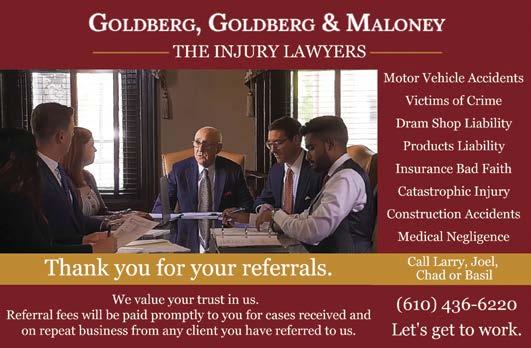


OBy Mark Blank, Jr., Esquire
nce again, ’tis Black History Month. If you are going to read any further (and I assume that you are, now that you have come this far), you might take a look at Black Lives Mattered [I] (New Matter, First Quarter, 2024).
The last year of significance that was discussed in that monograph was 1963, the date of the much sought after voluntary desegregation of Tulane and Rice, contrary to the wills of those universities’ founders. Since then, a lot has happened: the Civil Rights Act of 1964; the Selma to Montgomery March (1965), which proceeded contrary to the orders of Governor George Wallace, thanks to the governor’s law school classmate, District Judge Frank Minnis Johnson1; in 1966, the upholding by SCOTUS of the federal criminal indictments2 against Deputy Sheriff Cecil Price and other Mississippi Klansmen for the murders of three civil rights workers. See: United States v. Price, 383 U.S. 787 (1966).
The same year as United States v. Price, in the wee hours of the morning on June 17th, two armed African American men entered the Lafayette Bar and Grill in Paterson, New Jersey, opened fire, executing the bartender and two patrons, and
1See: Williams v. Wallace et al, 240 F. Supp. 100 (M.D. Ala. 1965).
2See: 18 U.S.C. Sections 241, 242.
severely injuring another, the latter being rendered partly blind.
Four months later, two men were arrested and charged with the triple murder: Rubin “Hurricane” Carter, a 30-year-old Black man (and a top contender for boxing’s Middle Weight Crown) and John Artis, a 20-year-old African American about to enter college on a scholarship.
The defendants were initially tried in 1967. They were both convicted of first degree murder and sentenced to life in prison.
For the next twenty plus years, the case of Rubin Hurricane Carter (and John Artis) “ . . . took a tortuous and often circuitous route through the New Jersey courts [;] the circumstances surrounding the killings and subsequent prosecution of Carter and Artis [became] a mosaic.” Carter v. Rafferty, 621 F. Supp. 533 (D.N.J. 1985), 535.
From the time of his arrest until his death, Rubin proclaimed his innocence on the facts, accompanied by assertions of flimsy evidence, prosecutorial misconduct and racial bigotry, the latter of which gained the most public attention.
The procedural history of State v. Carter in the New Jersey courts is complex. To begin, the defendants appealed their convictions, which were affirmed by the New Jersey Supreme Court, State v. Carter, 54 N.J. 436 (1967) (“Carter I”3), certiorari denied, 397 U.S. 1948 (1970).
In 1974, defendants filed a motion for a new trial, which was denied. State v. Carter, 136 N.J. Super. 271 (Cty. Ct. 1974). A second new trial motion was lodged on 30 January, 1975, which motion was denied. State v. Carter, 136 N.J. 596 (Cty. Ct. 1975). In 1976, the New Jersey Supreme Court overturned the convictions and ordered a new trial. State v. Carter, 69 N.J. 420 (1976) (“Carter II”)4
When the case was remanded, there were numerous motions and hearings. The trial began in October 1976 and concluded two months later, at which time defendants were, once again, convicted of first degree murder. The Appellate Division confirmed the convictions on October 22, 1979. (The opinion was unreported.) The New Jersey Supreme Court reversed. State v. Carter, 85 N.J. 300 (1981) (“Carter III”).
The remand hearing in the trial court lasted for 15 days and, in an unreported opinion dated August 28, 1981, the judge found against defendants on all issues. The New Jersey Supreme Court affirmed the convictions by a 4-3 majority. State v. Carter, 91 N.J. 86 (1982) (“Carter IV”).
Subsequently, defendants filed an application in the trial court for an evidentiary hearing relating to exculpatory materials allegedly contained in the file of a former prosecution investigator: denied; appeal to the Appellate Division, affirmed, in an unreported decision.
Whew! Enough! Wow! At least for New Jersey state courts, that is. It is now time to go to the federal courts. In February 1985, Carter (and Artis) petitioned for habeas corpus relief in the United States District Court for the District of New Jersey. The petition contained numerous counts, three of which involved Brady violations5; that is, that the prosecution withheld potentially exculpatory evidence.
Moreover, the state was alleged to have violated the Equal Protection and Due Process rights of the petitioners by improperly appealing to racial prejudice during the trial, in claiming that the homicides were motivated by racial revenge; that the jury was permitted to consider material not introduced into evidence; and that members of the jury had preexisting racial prejudice.
The District Court, per the Honorable H. Lee Sarokin, granted the petition and ordered the immediate release of the petitioners from custody. Carter v. Rafferty, 621 F. Supp. 533 (D.N.J. 1985). The state initiated two appeals. The first objected to the release of Carter and Artis from custody pending appeals. The Court of Appeals upheld the District Court on this particular issue. Carter v. Rafferty, 781 F.2d 933 (3d Cir. 1986).
The state’s second appeal was on the merits. The Court of Appeals affirmed. Carter v. Rafferty, 826 F.2d 1299 (3d Cir.
1987). The United States Supreme Court denied certiorari, 484 U.S. 1011 (1988).
In his opinion, Judge Sarokin thoroughly addressed all of the underlying allegations set forth in the habeas petition. In his introduction and conclusion, however, the learned judge made a particular point of racial prejudice and the improper use of the “racial revenge theory,” both here and in criminal litigation in general.
The Court: “Introduction . . . [T]he jury was permitted to draw inferences of guilt based solely upon the race of the petitioners [Carter and Artis], but yet was denied information which may have supported their claims for innocence. To permit convictions to stand which have as their foundation appeals to racial prejudice and the withholding of evidence critical to the defense, is to commit a violation of the Constitution as heinous as the crimes for which these petitioners were tried and convicted . . . Were it not for these grave constitutional violations, the court concludes . . . the guilty verdicts of the jury might well have been otherwise.”
Carter v. Rafferty, supra, 534. The District Court ultimately concluded that the state (1) violated the Brady Rule; and (2) that it violated the Due Process rights of Carter and Artis in appealing to racial prejudice during the trial, by arguing that the killings were motivated by racial revenge. Id., 558.
“Conclusion . . . [T]he court is convinced that a conviction which rests upon racial stereotypes, fears and prejudices violates rights too fundamental to permit deference to stand in the way of the relief sought . . . It would be naive not to recognize that some prejudice, bias and fear, lurks in all of us. But to permit a conviction to be urged based upon such factors or to permit a conviction to stand having utilized such factors diminishes our constitutional rights.” Id., 560.
The state came forth with a myriad of lame excuses as to why not to, once again, prosecute and try Hurricane and John. But here is my guess as to the real reasons for that decision: (1) shame; (2) new prosecutors and their staff who were mere toddlers at the time of the murders and void of any personal vendettas; and (3) the state would be sure to lose, causing even more embarrassment, in the media and in the public at large.
Yes. Rubin Hurricane Carter’s life mattered. And for that matter, so did John Artis’s. The case against Artis had even more weaknesses than that against The Hurricane. Nevertheless, Rubin had turned down a state’s offer which provided that he would testify against John.
Rubin Carter had a lot of help and support throughout his long journey to freedom. He had teams of lawyers and legal scholars, mostly working pro bono, who believed that he was
Continued on page 12
3This and all subsequent similar designations courtesy of District Judge H. Lee Sarokin. See: Carter v. Rafferty, supra
4The Court concluded that the prosecution had withheld exculpatory evidence from the defense.
5Brady v. Maryland, 373 U.S. 83 (1963).
Continued from page 11

wrongly convicted. As for lay support, Lesra Martin, who was an illiterate impoverished boy from the streets of Brooklyn, learned to read and write with the help of his adoptive parents, after which he read Rubin’s autobiography. Lesra was raised on a commune in Toronto; he and his communal parents befriended Rubin and assisted the Hurricane in his quest for justice.6
Rubin was paid visits by singer/songwriter Bob Dylan, who took to Hurricane’s cause and co-wrote, with Jacque Levy, Hurricane7, one of my favorite popular music compositions of all time.
In 1994, Judge Sarokin was appointed by President Clinton to the Third Circuit Court of Appeals. In 1996, Presidential Candidate Bob Dole referred to Judge Sarokin and some other Clinton appointees as “liberal activists”.8
Rubin Hurricane Carter’s life certainly mattered, not just to some, but to many. “And that’s the story of Hurricane. But it won’t be over til they clear his name; and give him back the time he’s done. Put in a prison cell but one time, he could have been the champion of the world.” Bob Dylan, Hurricane
6Lesra eventually became a lawyer and highly respected member of the Canadian Bar.
7The song was released as a single in 1975 and the opening track of Dylan’s 1976 album Desire
8Judge Sarokin retired in 1996, after which he became an advocate for the wrongly convicted. Trust Steve Costello, Esq. when you need an experienced arbitrator or mediator in
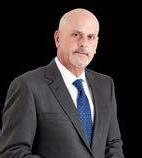






ABy Greg Nardi CCBA Executive Director
s we begin 2025, I’m excited to share the Chester County Bar Association’s continued focus on fostering community and connection within our organization. This year, we’re making a concerted effort to include lawyers’ families in our events and initiatives, recognizing the vital role they play in our personal and professional lives. By broadening our reach to include families, we aim to deepen the sense of belonging that makes our association a cornerstone of Chester County’s legal community.
Family-focused events will be a highlight of our calendar this year, starting with a range of activities designed to bring members and their loved ones together. We’re
planning our annual Family Outdoor Movie Night (May 31), a Trunk or Treat event with fall festival activities (October 18), and opening the CCBA building for members and their families on the evening of the West Chester Christmas Parade for cookies, hot chocolate, and fellowship. These gatherings are opportunities for members to connect outside the courtroom, sharing laughter and experiences with their families while strengthening ties with colleagues.
These events are about more than just fun—they reflect our belief that a strong community is built on relationships that extend beyond professional boundaries. We hope to see you and your families at these events, enjoying the camaraderie and making memories.
Our past presidents are integral to our community, offering wisdom and continuity. This year, we’re excited to introduce a new position on the Board of Directors for a Past President who is six years removed from the board. This one-year term will provide fresh opportunities to
draw on their experience while keeping them actively engaged with the association.
We will also host two dedicated events to maintain this connection. In the spring, we’ll hold our Past Presidents’ Breakfast at the CCBA building. This local event allows for more participation and provides an intimate setting for updates and feedback. In the fall, the Past Presidents’ Dinner will precede the Bench Bar Conference at the Borgata in Atlantic City (September 18-20), providing another opportunity for fellowship and counsel.
Our Small and Solo Practice Section continues to be a vital space for members navigating the complexities of running a small business alongside their legal practice. In 2025, we will focus on succession planning, addressing this critical issue with resources and support to help our members prepare for the future. Regular meetings of this section foster a sense of community, ensuring members know they are not alone in their challenges.
The Young Lawyers’ Division (YLD) will also carry forward its vibrant traditions while embracing our family-focused initiatives. From the Mock Trial competition in early 2025 to happy hours and the YLD Boat at the Bar Sail event in June, the YLD will remain a dynamic force in our association. Importantly, we’re encouraging families to join in the fun, creating more inclusive events that cater to young lawyers and their loved ones.
Our most experienced attorneys will begin (again?) to hold Senior Lawyer Lunches. These meetings are meant to bring our most dedicated and longest-termed members together to share in some camaraderie and potentially pass along some lessons in life and the law.
2025 marks the 40th anniversary of the Chester County Bar Foundation, a milestone that speaks to the incredible impact this organization has had on our community. Over the past decade alone, the Foundation has granted over one million dollars to local nonprofits and to community-focused programs within the CCBA. It’s inspiring to reflect on the vision of the key leaders who founded the organization in the early 1980s and the tremendous progress made through the dedication of hardworking members and leaders since then. The Foundation’s growth and ongoing commitment to serving the community are a testament to the power of collective effort and shared purpose.
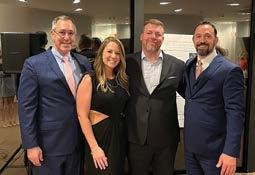
Our incredible staff is the heartbeat of the CCBA, and this year, we celebrate a remarkable milestone: Genya Cunningham’s 30th year with the Chester County Bar Association. Genya’s dedication, energy, and commitment set the tone for all of us, embodying the spirit of community we strive to nurture.
In recognition of her outstanding contributions, Genya was honored with the Annual Board of Directors Award at the President’s Dinner in January. Her example reminds us of the importance of dedication and the lasting impact one person can have on an organization.
As we embark on this year’s journey, my hope is that we all will embrace the opportunities for connection and engagement that our association offers. Whether through family-focused events, professional development initiatives, or simply taking time to connect with colleagues, 2025 promises to be a year of growth and community for the Chester County Bar Association.
Together, we can build a stronger, more inclusive association—one that not only supports our professional lives but also enriches the lives of our families and the broader Chester County community.


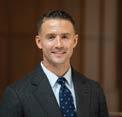
MACELREE HARVEY, LTD recently welcomed NATALIE R. YOUNG to its Land Use Department.

BARLEY SNYDER partner and Intellectual Property Practice Group Chair SALVATORE
ANASTASI has been elected President-Elect of the American Intellectual Property Law Association (AIPLA).
HAMBURG, RUBIN, MULLIN, MAXWELL & LUPIN is pleased to announce that MICHAEL S. GILL, an experienced real estate attorney representing clients on all sides of commercial real estate matters, has joined the firm.

BARLEY SNYDER is pleased to announce attorney THOMAS T. PLATTS has recently joined the firm in its York office. He is the newest addition to Barley Snyder’s Business and Real Estate practice groups.
Upon completion of his activeduty tour of duty as a Marine Judge Advocate, CCBA member
JAMIE W. GONCHAROFF, JR. received his LL.M. from the University of Pennsylvania. Jamie is now serving a federal clerkship in the US District Court for the Eastern District of Pennsylvania for the Honorable Jeffrey L. Schmehl, while also serving as a trial counsel in US Marine Corps Reserve.
MARY JO GILSDORF, ESQUIRE, has been accepted into the National Academy of Distinguished Neutrals (NADN).
The Civil Division of the Court of Common Pleas is accepting resumes for Board of View, Partition Hearing Officers, and Discovery Hearing Officers. The attorneys will be placed on court approved lists for assignment from the court. Submit resumes with a cover letter by Monday, March 17, 2025 to the attention of Jennifer Neff, Civil Court Administrator, JNeff@chesco.org.


BARLEY SNYDER has welcomed ROBIN L. FELTY as Chief Operating Officer. Felty brings more than 15 years of experience in operations leadership and strategic planning to Barley Snyder. Her role became effective December 16, 2024.
BLAINE FEINAUER, ESQ. is now partner at SAUL EWING.
The YLD had a successful 2024, hosting more than 10 meetings and events, and adding 77 new YLD-eligible members to the group. The Young Lawyers’ Division is open to those members of the CCBA aged 40 or younger. For more information or to get involved, email Lauren Shea at LShea@chescobar.org
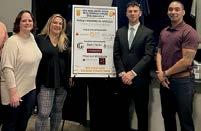
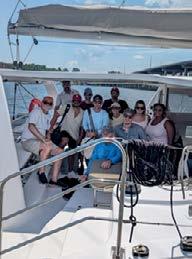
Lauren
Lauren A. Nehra, Esq. Unruh Turner Burke & Frees

SECRETARY/ TREASURER






By John R. Embick, Esquire John R. Embick, PLLC Chair of the CCBA Environmental Law Section
On December 9, 2024, Westtown Township received the deed to 206 acres of Crebilly Farm. This acquisition is authorized by Act 442 of 1967, as amended, and known as the Preserving Land for Open Air Spaces Act, codified at 32 P.S. §§ 5001, et seq. (“Open Space Act”). The Open Space Act authorizes the Commonwealth of Pennsylvania and local government units thereof to preserve, acquire or hold land for open space uses. The Open Space Act further provides several local taxing options to support these activities.
This important property conveyance was several years in the making, and involved the efforts of hundreds of people. A pivotal event occurred on November 8, 2022, when the voters of Westtown Township overwhelmingly passed a referendum authorizing the imposition of a tax based on real estate and earned income to create an open space fund. Initially, the open space fund will be used to service the debt incurred by the sale of municipal bonds needed to generate some of the revenue for the purchase. I wrote about this extraordinary vote in New Matter, 1st Quarter, 2023.
The purchase price for Crebilly Farm was over $20,000,000.00, and the Township’s share was approximately $7,500,000.00. Additional funds (or promises of reimbursement) were received from the federal government, the Commonwealth of Pennsylvania, Chester County, and generous private donors. One of the interesting issues involved in open space acquisition, is that in many cases, the buyer has to assemble enough cash to close the deal, and then seek grant reimbursements after the property conveyance. There are many details to be dealt with and lots of anxious moments occurred on the road to closing. Westtown Township’s Board of Supervisors, administrative staff and counsel did a great job in making this important open space acquisition happen. Crebilly Farm’s prior owners are to be commended for agreeing to sell the property to the Township and for their patience over the long road to settlement.
Now, Westtown Township must prepare Crebilly Farm to be public open space. No specific plans have been announced as yet, but the initial steps will be taken in early 2025.
Contrast the Westtown Township struggle to acquire Crebilly Farm with Upper Pottsgrove Township’s (Montgomery County) effort in 2024 to construct a
municipal building complex on property allegedly obtained under the authority of the Open Space Act. A number of citizens objected to the use of public open space for this purpose and sued Upper Pottsgrove Township.
The story is told in an opinion by Montgomery County Judge Jeffrey S. Saltz in the matter of Murray, et al. v. Slinkerd, et al, No. 2023-02216, issued on October 18, 2024.
Based on facts adduced at a trial on the merits, Judge Saltz determined that in 2006 the voters of the Township approved an open space tax in accordance with the Open Space Act. The Township collects the open space tax which produces approximately $555,000.00 per year. In 2008 the Township purchased a portion of the Smola Farm, comprising about 36 acres, for $450,000.00. Over the years, the Township transferred some general fund revenues into the Township Open Space Fund, and deposited additional funds from the proceeds of some “Guaranteed Open Space Revenue Notes.” To secure repayment of the Guaranteed Open Space Revenue Notes, the Township pledged revenues from the open space tax proceeds. The payment for the Smola Farm was drawn on the Township’s Open Space Fund (which contained commingled funds). Judge Saltz found that because the Township commingled funds from the Township’s general fund, and the Open Space Fund, it was impossible to determine how much of the Smola Farm purchase price was actually paid from Township open space tax revenues.
The Township apparently took the position that the plaintiffs could not prove that the Smola Farm was acquired with Open Space Act tax funds, and therefore the Township was not constrained by the provisions of the Open Space Act in using a portion of the Smola Farm for the construction of a municipal building complex.
Based on the evidence produced at trial, Judge Saltz found as follows:
16. It was the intention of the Township, as expressed by its citizens in the 2006 referendum and the Commissioners’ actions for acquisition of the Smola Farm in 2008, and confirmed in the 2020 Open Space Plan, the Smola Farm would remain preserved as open space and would be subject to the provisions of Act No. 1967-442 (Jan. 19, 1967), as amended in Act No. 1996-153 (Dec. 18, 1996), 32 P.S. 5001-5013 (“the Open Space Lands Act” or “the Act”).
Slip op.at 4.
With these evidentiary findings, Judge Saltz concluded as a matter of law, as follows:
Nevertheless, a review of the statute as a whole makes clear the legislative intent that when a government unit acquires land for open-space purposes under the Act, it may not use the land for contrary purposes.
Slip op. at 5.
Judge Saltz’s decision was made under the authority of Pa. R.Civ.Pro. 1038 (it is like a decree nisi), and therefore is not final. The Montgomery County Court docket indicates that post-trial motions have been filed, and no appeal has been lodged as yet.
One of the lessons I think we should learn from Murry et al. v. Slinkerd, et al., is that open space tax revenues should not be commingled with other funds, and the acquisition of land for open space purposes should be carefully conditioned and documented. Open space acquisitions should be added to municipal open space or recreation plans. In connection with Westtown Township’s acquisition of Crebilly Farm, some of the entities providing public funds for the purchase required Westtown Township to enter into binding trust agreements or declarations specifying how the Township may use the property. Interestingly, the historic building known as the Inn at Darlington’s Corner (also known as the Westtown Inn), which stands on the northwestern corner of the intersection of Route 202 and Route 926, will be subdivided from one of the Crebilly Farm parcels that was acquired. Westtown Township now owns this structure, but its future is uncertain.


Steve Lagoy, Esquire
• Pepperdine Law –Dispute Resolution Diplomate
• Martindale Hubbell AV-rated – 25 years
• Pennsylvania Super Lawyer (ADR) – 14 years
utbf.com | 610-692-1371 | slagoy@utbf.com
Honoring the 2024 CCBA President, Donald B. Lynn, Jr.
Loch Aerie Mansion, Malvern | Friday, January 17, 2025
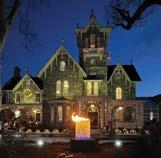


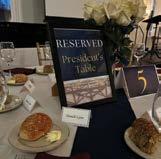

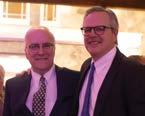

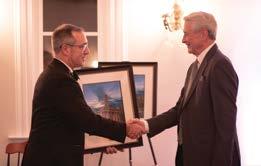
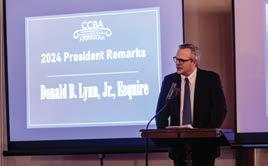
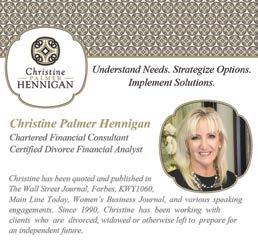






Throughout Chester County, community philanthropy leaders come from all walks of life. The Chester County Community Foundation gratefully highlights Mike and Nancy Pia of Kennett Square; Duke Schneider, Esq., of West Chester; and Stephanie Pahides Kalogredis, Esq., and Bill Kalogredis, Esq., of West Chester. Their commitment to strengthening and feeding families, ensuring legacy philanthropy, and celebrating cultural heritage foods exemplifies the heart of giving, ensuring a brighter future for all.
As a teacher, author and artist, nurturing children’s growth and creativity comes naturally to Nancy Pia. And as a successful international mushroom producer, Mike Pia knows a lot about good, healthy food and its distribution.

They were stunned to learn that in their own backyard of Kennett Square, last year more than 5,000 neighbors obtained over 820,000 pounds of donated food. And the need is growing.
The Pias knew they could make a positive difference in the lives of families. First, they donated land to help Kennett Area Community Service (KACS) enlarge its footprint. Then, to keep the ball rolling, they provided significant lead funding to draw up architectural plans, obtain construction permits, and seed the fundraising. Now, Nancy is helping with the capital campaign, inspiring others to give to the KACS building and services expansion.
“Hunger is a silent crisis that affects every corner of Chester County,” the Pias shared. “No child should ever go to bed hungry, wondering where their next meal will come from. Addressing food insecurity isn’t just about feeding people today; it’s about breaking the cycle of poverty by helping
families obtain the resources they need to succeed. The new KACS facility will enable people to access a fuller circle of care.”
Dedicated to the belief that every child deserves a life of physical and emotional well-being, the Michael and Nancy Pia Foundation focuses on providing children and families with ready access to healthy food, safe and affordable housing, holistic health care, and education. The Pias aim to break the cycle of poverty and hardship, and help children and families thrive.
Duke Schneider, Esq., is passionate about helping families with succession planning, especially family-owned and closely-held businesses. Many of these businesses are first or second generation enterprises, with roots in agriculture and food production.

Duke explains the power of breaking bread together: “With family succession planning, it’s hard to walk in cold and come up with brilliant ideas that fit the family’s particular situation. I find that when we can warm up over food and drink, we get to know each other better. I get a chance to see people’s decision-making processes, communication styles, likes and dislikes. This helps build a sense of shared camaraderie; enhances trust; and allows me to better customize our approach.”
Duke’s succession planning also includes bringing legacy philanthropy options to the attention of his clients. A longstanding Chester County Community Foundation Door Opener, Duke promotes the value of nurturing charitable impulses now and for generations to come. “I plant a seed; the family determines how it grows.”
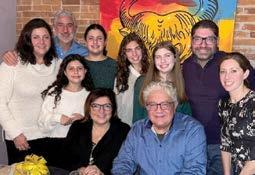
Lamb McErlane
Board Vice Chair; Fund Advisors FOOD, FAMILY & CULTURAL HERITAGE
“Food is love. It connects us to our families, our cultural heritage, and each other. When we share meals with others, we learn about the people and the history of their traditions,” enthuses Stephanie.
Stephanie explains, “Each Christmas season, at our St. George Greek Orthodox Church the members of the local chapter of the Daughters of
Penelope bake over 500 trays of spanakopita, baklava, kourambiethes and fenekia. It’s a meaningful, tangible, delicious way to share our Greek heritage with new people, as well as make sure the upcoming generations remember our recipes, traditions and stories. Plus the profits go to scholarships and other local and national charities.”
Adds Bill, “The true Mediterranean diet is one of the most healthy ways to eat. It’s vital to ensure that fresh and healthy food is available to everyone, whether in grocery stores, on the shelves of their food banks, in home gardens, or from the farm down the road. And when the food relates to their heritage, it satisfies a deeper need.”
Through their legacy fund at the Chester County Community Foundation, Stephanie and Bill Kalogredis instill in their family the importance of caring for those less fortunate. In Greek the word is “philotimo” –consciously honoring one's responsibilities and duties to themselves, their family and their community. On Christmas Eve, Bill and Stephanie gather with their children and grandchildren where each family member, young and old, presents a charity for consideration and shares why they believe the charity is deserving of support. The nominees range from no-kill shelters to educational opportunities, from disaster relief to social services. But, as Stephanie explains, “ There is always great support for food access. It is in our blood; one of my dreams is ensuring that every person has access to good, healthy, culturally meaningful, tasty food. For Good. Forever!!
Continued on page 24
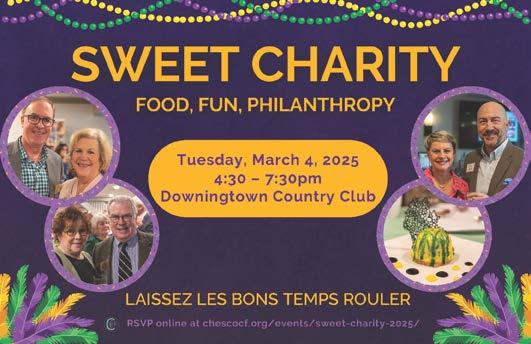
Continued from page 23

Sweet Charity at Downingtown Country Club Tues., March 4, 2025 from 4:30-7:30 p.m.
Food is essential to the well-being of the entire community, building health, relationships, understanding, trust, and a sense of identity. The Community Foundation’s ever-popular Sweet Charity will be held at the Downingtown Country Club. Taking place on Mardi Gras eve, “let the good times roll” at this delicious, casual networking event. Join us to sample Chester County’s finest desserts to help the Foundation today and make a difference forever.

Chester County Community Foundation 28 W. Market St., The Lincoln Building West Chester, PA 19382 www.chescocf.org | 610.696.8211
Zeb Davenport, Ed.D., Chair of the Board
Karen Simmons, President/CEO Jason Arbacheski, CAP®, Gift Planning & Stewardship Director






Where do you live?
East Norriton, PA, in a house that was built in 1771. I have always wanted to live in a museum, and I am proud to say that I do. It is mind blowing to me that there are only nine signatures between us and Charles, II. It was once owned by the Carter Family (clothing, not presidential {RIP}) who added a giant wing to it. I am the third attorney to own it, another fact which makes me very pleased. The second attorney to own it added another wing, a sunporch and three-car garage, which does actually house our cars. The last point of pride is that it is a local historic treasure for the fake oven in the basement which was known to be part of the Underground Railroad. So cool!
What was your first job?
Babysitting. It’s hard for me to believe that when I was 8, I was left in someone else’s home in charge of their 4-year-old son and infant daughter. When I was 13, I had my own window washing business with my twin. I am an identical twin. She does gynecology and women’s health. Her favorite thing to do is to teach a woman about her body so that she can become pregnant. Which is funny since I do elder law. So, the opposite end of the spectrum. She helps bring life into the world and I wind up it. Book ends, we are book ends.
What word best describes you? Complex.
Where would we find you on a Saturday afternoon? Sadly, at the office. In my dream world, in Chincoteague, VA.
What is your favorite way to spend your free time?
Doing anything with my husband or family. We try to have dinner together every Sunday. I started it during COVID and it’s still going strong. I did not want to look back and regret not spending enough time with my parents. I wanted to make pleasant memories for everyone in my family.

What is your greatest extravagance?
Quilting. The fabric doesn’t talk back to me. There is something relaxing about cutting it up and sewing it back together again. Also, I like that I can unsew and resew without first filing a Motion for Reconsideration.
What is your favorite vacation destination? Europe. Everything seems better over there.
What is your favorite food? Italian anything. It’s in my genes.
Who is the person you are most interested in meeting?

Jesus. I have deep faith in Him. I also have so many questions that I’d like answered.

What was the last book you read?
Deadly Depths – at the beach in Chincoteague. There’s one part where a tiger shark attacks, made much more intense by the crashing waves I was hearing. It’s a good beach book. I highly recommend it.
What is your favorite TV Show? Outlander. I long for simpler times when people’s word was their life. When you could depend on your neighbor to do what they said that they were going to do. When you worked for the betterment of society simply because you wanted to be a productive member of it.
What goals do you still have that you have not achieved yet?
Retirement. I’ve seen lawyers that never leave the practice and I’ve seen a few who did. I think that the ones who left seem happier to me. It’s a couple of decades off, but I do look forward to retiring eventually.
What is a little-known fact about you?
My family got here in 1704. We have not gone far; we are in the same basic area. It chokes me up to think that I’ve had ancestors in every war this country has ever fought, even before it was a country.
What is your favorite website?
Google. You can find just about anything on Google. Reels for quick Sunday dinner ideas.
What would you be if you were not a lawyer? A hairdresser. That’s what I wanted to be for the longest time. You can tell by my hair style that I have no talents there. So, it probably is good that I did not become a cosmetologist!
What is something people would be surprised to hear about you?
I went to law school much later in life.
What is your favorite thing about the bar association?
The people, of course. I have fun in everything I do at the CCBA. I love educating colleagues in the elder law meetings that Janet Colliton and I do every month (and I thank her profusely for putting up with me). I really enjoy going to Barry Rabin’s B.U.L.L. sessions – very informative. Maria Janoski makes editing for the New Matter hilarious – oh how we laugh. Jamie Goncharoff gives entertaining Veterans committee meetings – he tells the best stories. The amazing staff would be on my list too. You’re all great!


